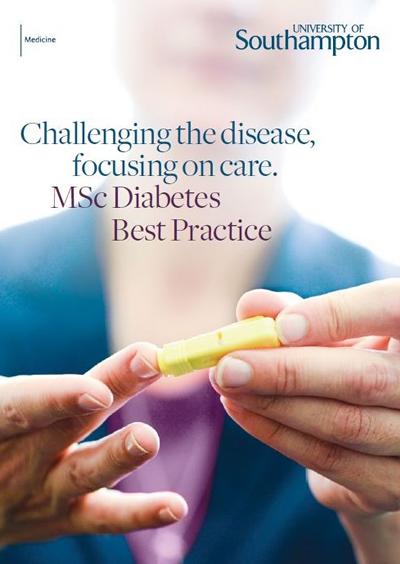Specialist diabetes care improves health outcomes

It is estimated that over 420 million people have diabetes, a number that’s likely to more than double in the next 20 years.
The UK alone faces an overwhelming increase in the number of people with type 1 and type 2 diabetes, with over 700 new cases diagnosed each day, and numbers continuing to rise.
Last week the World Health Organization’s World Health Day focused on the need to halt the explosive rise in diabetes worldwide.
Healthcare research consistently concludes there is a recognised need for specialist diabetes care both in the UK and internationally. Our academics are actively engaged in research exploring the challenges of self-management for people with diabetes and the crucial role that healthcare professionals can play in the care, self-management and health outcomes of those with the condition.
Recent international collaborative studies involving University of Southampton academics show that when people with diabetes feel they have a close relationship with their healthcare professional or team, they are more likely to follow their diabetes care plan.
This research also suggests that demographic, psychological, social dynamics and other factors such as communication, diabetes education and family support, affect diabetes self-management and adherence.
A recent NHS toolkit developed for those involved in out of hospital care for people with diabetes, also presents the case for improving education and training for community based healthcare professionals.
Paul Perfrement from Hampshire, who has type 1 Diabetes, said: “Having a Diabetes specialist nurse can make all the difference in how a patient is treated for the condition, and how they cope in their own environment.”
MSc Diabetes Best Practice Programme Leader, Dr Nicola Englyst, said: “Diabetes UK and other professional bodies have highlighted a shortage of specialist knowledge in diabetes care, especially in psychological, paediatric and nutritional aspects of the condition. We offer a programme that uniquely provides the most up to date education in these areas, helping UK and international health care workers to develop skills for the optimum management of their patients.”
The results of the study, titled: ‘Correlates of psychological care strategies for people with diabetes in the second Diabetes Attitudes, Wishes and Needs (DAWN2TM)‘, whose lead author is University of Southampton academic, Professor Richard Holt, are expected to be published shortly in the journal, Diabetic Medicine.